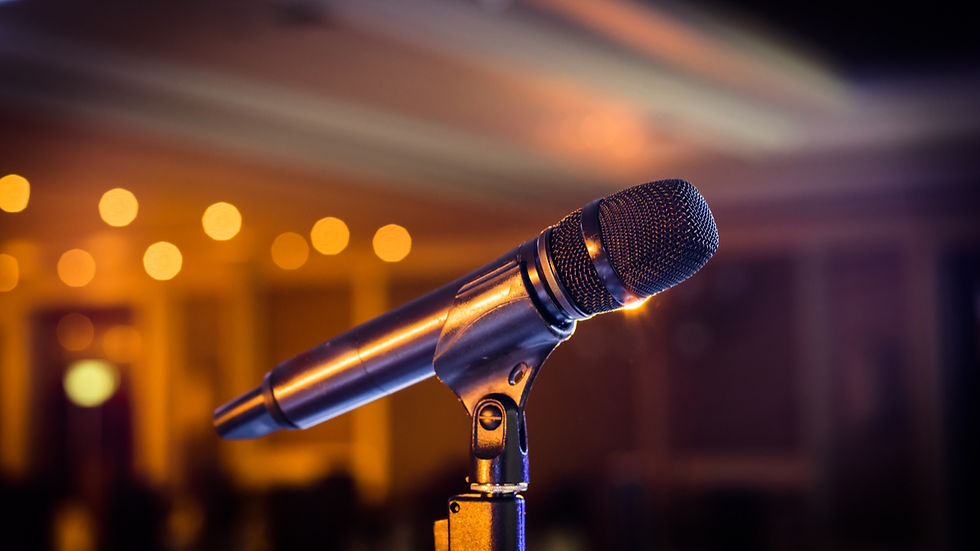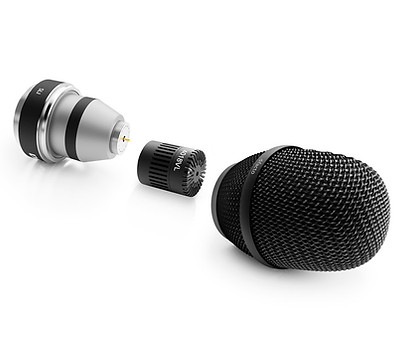
Wireless Capsules
Shure Beta 58
The Shure Beta 58A wireless capsule is a cardioid dynamic microphone capsule. It takes many of the characteristics of the SM58 and puts them in a capsule which is compatible with all Shure products and many other wireless transmitters. Since we’ve already discussed the SM58, I’m not going to go into much detail about this capsule. If you are interested, you can view the page in the header menu, or by clicking here. This is by far the cheapest capsule of quality you can purchase. The current cost is approximately $130.


Shure KSM9
The Shure KSM9 is a cardioid (or supercardioid) condenser microphone. It is designed specifically with the vocalist in mind. It can capture a wide dynamic range and the subtleties of vocalists and other acoustic instruments. The polar response patterns on this microphone are switchable and can be changed depending on the situation. We used these microphones at Cherry Hills with great success on our vocalists. The primary downside was how harsh they were. Depending on your vocalist or speaker, the KSM9 can get very edgy and the S’s can become much more pronounced. However, this microphone is a reliable microphone that I used for many years with great success on our wireless systems at Cherry Hills. You can purchase a stand-alone KSM9 microphone or a KSM9 wireless replacement capsule. The capsule costs $550.
Telefunkin M80
The Telefunkin M80 is a relatively new microphone that is quickly proving itself in the live touring world. It is a supercardioid dynamic capsule. However, it has been praised for the high amount of clarity that it produces, sometimes even being referred to as “condenser-like.” It is designed for vocalists and instruments that have a wider range of dynamics and subtlety, and is one of my favorite vocal microphones.
When I was the Next Generation Technical Director at Cherry Hills, I was operating all tech needs for one of our summer camps. At this camp, we were encountering all kind of feedback with our Shure wireless system. We shouldn’t have been encountering it that much since everything was set up right. However, I switched the vocalist to a M80 and had zero problems with feedback. In fact, the sonic quality of the microphone was better than any of the Shure capsules I had used on that specific vocalist. I liked it so much I used it on both of our vocalists (male and female) and they sounded incredible. The wireless capsule is an identical copy of the wired microphone and will retain all the same characteristics. It is compatible with all of the Shure systems (excluding the BLX, GLXD and PGXD), and is compatible with the Lectrosonics system. At a cost of $250, I would strongly suggest giving this microphone capsule a shot for any of your vocalists.


DPA d:facto 4018
The DPA d:facto 4018 is one of the only capsules that is compatible with any wireless system I have worked with. As we discussed with the DPA 4099, DPA is known for having a very flat frequency response curve and does its best to not negatively impact the source in any way. This microphone retains those characteristics and is by far the best wireless capsule I have ever used. It is a supercardioid pre-polarized condenser microphone. Pre-polarized means that there is an internal power supply that is permanently fixed to the back of the transducer supplying it power instead of utilizing an external power supply. The supercardioid pattern gives it a high gain before feedback, and it is able to handle very high levels of SPL.
For the longest time, we were using Shure KSM9 capsules at Cherry Hills and then switched our pastor and one of our lead vocalists over to this microphone. We were encountering a lot of edginess and harsh frequencies from both the pastor and worship leader with KSM9’s and the DPA d:facto 4018 smoothed the vocals out and removed much, if not all, of the harsh frequencies we were encountering. This microphone capsule can be a little pricey though, at $1050. This specific model can have different adapters purchased to make it function with either Shure, Sennheiser, Sony, or Lectrosonics systems. A cheaper option of this microphone is the DPA 2028 at $700.
